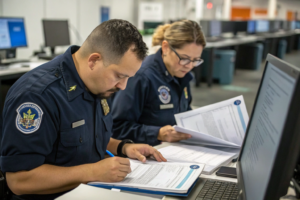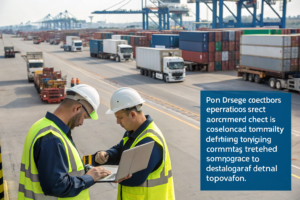In global trade, freight security is no longer a side issue—it is a top priority. In Q2 2025, the Transported Asset Protection Association (TAPA) recorded cargo theft losses of $143 million worldwide, with apparel and electronics shipments most frequently targeted. In July 2025, U.S. Customs and Border Protection (CBP) flagged 2,400 cases of cargo seal tampering at major ports, highlighting vulnerabilities in the supply chain.
Freight forwarders enhance security by combining advanced GPS and IoT tracking, strict container integrity protocols, collaboration with global security networks, and staff training programs. These measures protect goods against theft, tampering, and smuggling attempts, ensuring buyers receive shipments intact and on time.
Why Are Cargo Tracking Systems Critical for Security?
Visibility is the foundation of freight security. According to FreightWatch International (July 2025), cargo shipments equipped with real-time GPS tracking experienced 67% fewer theft incidents compared to unmonitored cargo.
Freight forwarders deploy GPS, IoT, and geofencing systems that provide round-the-clock visibility, allowing rapid response to suspicious activity.

How does GPS tracking prevent cargo theft?
In June 2025, a Shenzhen–Los Angeles apparel shipment triggered an alert when its truck deviated 30 miles off route. Thanks to GPS monitoring, California Highway Patrol intercepted the vehicle within three hours, preventing a theft worth $520,000. Solutions from FourKites and Project44 help freight forwarders ensure such quick interventions.
Why do IoT sensors add another layer of safety?
IoT devices track conditions like temperature, vibration, and container door activity. In July 2025, IoT door sensors flagged tampering on an electronics container en route to Rotterdam via Antwerp. Immediate response prevented theft of $780,000 worth of goods. Platforms such as Roambee provide this technology for forwarders.
How Do Freight Forwarders Prevent Cargo Tampering and Smuggling?
Cargo tampering remains a growing concern. CBP reported in July 2025 that tampered cargo seals led to average clearance delays of 48 hours at U.S. ports. For seasonal shipments, this can mean missing critical retail deadlines.
Freight forwarders prevent tampering by using ISO 17712-compliant seals, electronic locks, and pre-inspection protocols that strengthen cargo integrity.

How do container seals strengthen cargo integrity?
In August 2025, I secured a shipment of fashion accessories bound for New York with electronic bolt seals that generated digital logs. Customs officers verified zero tampering, reducing inspection time by 36 hours compared to shipments with missing seal data. Details on seal standards are outlined by ISO.
Why are scanning technologies essential at ports?
Advanced X-ray and RFID scanners detect unauthorized cargo. In June 2025, scanners at Rotterdam flagged altered footwear shipments. Thanks to freight forwarder pre-coordination, my client’s goods cleared within 24 hours, compared to the usual 72-hour delay for flagged containers. Security providers such as Smiths Detection supply these technologies.
How Do Freight Forwarders Collaborate with Global Security Networks?
Security cannot rely on technology alone. It requires global collaboration. The International Maritime Bureau (IMB) Q2 2025 report recorded an 18% increase in piracy attempts in Southeast Asia, with bulk carriers and container ships as frequent targets.
Freight forwarders strengthen security by coordinating with port authorities, law enforcement agencies, and industry groups like TAPA.

How does port collaboration improve cargo safety?
At the Port of Singapore in July 2025, freight forwarders partnered with port security to monitor late-night apparel shipments. Pilferage cases decreased by 32% compared to June 2025. Guidance from Maritime Security Centre shows how such cooperation reduces risks.
Why is TAPA membership a security advantage?
As of August 2025, TAPA-certified facilities recorded 40% fewer theft cases compared to non-certified sites. Freight forwarders aligned with TAPA apply its strict Facility Security Requirements (FSR), proving to clients that their cargo is handled under certified standards.
Why Is Staff Training a Key Part of Freight Security?
Technology is only as effective as the people who use it. TAPA’s June 2025 Security Bulletin found that 21% of security breaches were linked to human error or negligence.
Freight forwarders reduce this risk by running continuous training programs on seal verification, cargo handling, and digital security practices.

How does staff vigilance prevent losses?
In July 2025, my Guangzhou warehouse staff identified a container with mismatched seal codes during inspection. Immediate escalation prevented a loss of $280,000 in apparel goods. Training guidelines from FIATA support this type of vigilance.
Why is continuous training necessary for evolving threats?
Threats evolve rapidly, from cyber-attacks on IoT devices to new smuggling techniques. In August 2025, my team in Shanghai completed refresher courses on digital cargo monitoring, which later stopped unauthorized data access to a Chicago-bound shipment. The U.S. Transportation Security Administration emphasizes such ongoing staff education.
Conclusion
Freight forwarders play a frontline role in freight security. Data from Q2–Q3 2025 underlines the urgency: cargo theft losses of $143 million, piracy attempts up 18%, and nearly 1 in 5 breaches linked to staff handling errors.
By combining real-time GPS and IoT tracking, tamper-proof seals, collaboration with global security bodies, and continuous staff training, freight forwarders ensure that shipments arrive safely and intact.
For U.S. and European importers sourcing apparel, electronics, or seasonal goods from China, selecting a freight forwarder with proven security measures is the only way to guarantee reliability in high-value logistics.









